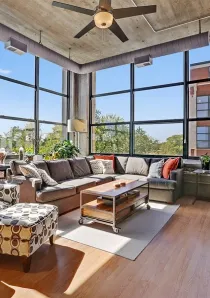The business of being an apartment landlord has always been a serious one. Still, rising rent prices in Chicago have produced a serious question for the apartment rental season ahead: “Am I charging enough for my Chicago apartment in 2025?”
First, to unpack this question a bit, if a landlord wonders whether or not their Chicago apartment’s rent reflects the market conditions, they’ll need to first dive into the state of the market.
Finding Fair Market Value for Chicago Apartments in 2025
The difference in rental prices varies by unit type and location within the city. For example, a one-bedroom apartment in the booming West Loop may have much higher rent than a similar apartment in a more residential area of Edgewater. A two-bedroom with a brand new kitchen and bathroom may garner more rent than a two-bedroom in the same building with a kitchen updated in 2008.
It's good practice for landlords to look closely at comparable units listed on Domu before decreasing or raising rent prices out of the gate. The neighborhood pages on Domu are an excellent resource for this type of analysis. There, landlords can see a range of rental prices for active listings. And it’s good to keep in mind that landlords who list their apartments on Domu can make on-the-fly adjustments to their listings, so they're never locked into a specific price point and can update rents to meet the market. For example, if you're not seeing many leads, that may be a sign to lower your asking price. Alternatively, if you instantly see tons of leads, you may want to go ahead and bump up your original rent.

How Long Should Chicago Apartment Landlords Prepare To List Their Apartments?
Chicago landlords enjoy a favorable rental market during spring and summer—savvy property owners know to plan for a lull once peak rental season ends in fall. Listing an apartment and finding a renter before the colder months can be essential to avoiding long-term vacancies. But if you miss the window, there are ways to catch the next rental season, like creating a lease that ends in the warm months instead of a standard 12-month agreement.
The demand to live in Chicago has notably outpaced the housing supply in recent years. More people returned to work in office or on a hybrid model, bringing an influx of renters back to the city. Residents shuffled the market by setting their sights on WFH-friendly apartments with more space. Additionally, Chicago summers almost always draw renters to the liveliest neighborhoods with great restaurants, entertainment, and shopping.
When landlords leverage Chicago’s high demand, rent prices skyrocket in turn. Both higher rents and inflation in general strain renters' budgets. With less approachable prices, the movement to find a new place can slow down. Those who have apartments stay put and lock in their rental rates. Others looking to move to the city may wait for more affordable rents.
As a reminder, seasonality is a crucial factor in determining how long it takes to rent an apartment. Chicago’s rental market is typically the most seasonal in the entire country. There’s a surplus of renters looking to move during the warmer months (May through September) and fewer during the cold weather months.

Tips for Avoiding Long-Term Vacancy in Chicago Apartments in 2025
With a veritable roller coaster of price changes hitting the market over the past few years, landlords should always brace themselves for the slow season. Regardless of price fluctuations brought on by inflation or other forces in the market, the absolute worst hit to a landlords' bottom line would be apartments sitting vacant. Here are some of the best tips that Domu has seen to reduce long-term vacancy in Chicago apartments.
Avoid Overcharging for Rent and Giving Renters Cold Feet
Landlords should view their rental apartments as an investment, no doubt. But following a tack that favors a quick return on that investment, over-treating it as a sustainable operation, can wind up backfiring for landlords. What does a sustainable operation look like? Getting renters to sign the lease is the ultimate goal of the process, but there are market pressures at each turn.
If rents are set at maximum value to reflect increases in the market, landlords might lose money if the apartment sits empty for too long. Find a happy medium by using Domu’s Rent Calculator. This calculator returns a rental price range based on annual income. This can also help during the tenant pre-qualification process for Chicago apartments when landlords assess a potential renter’s finances.

Landlords may also find that square footage doesn’t automatically equal higher dollar value for their apartment rent. Renters are willing to pay more rent for a place with amenities that make their lives more convenient, like in-unit laundry, central air-conditioning, and smart home upgrades.
A survey of Domu’s users revealed that renters are okay with paying a little extra to have a convenient feature like in-unit laundry in their apartment. So, it makes sense a renter might balk at the prospect of paying a higher rent for a bigger place that doesn’t have the convenience of in-unit laundry or a dishwasher.
The same logic applies to other cosmetic upgrades, such as hardwood flooring, newer bath fixtures, and modern appliances. Upgrading the apartment wherever possible will translate to a more premium rental price.
And last but certainly not least, landlords should never underestimate the value of quality photos when it comes to marketing an apartment listing. At any price point, the images on the listing do some serious legwork to entice renters to see the apartment in person. Landlords should make sure the photos posted to their listing are up to the level they anticipate charging in rent.




